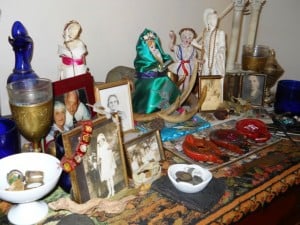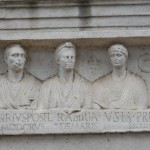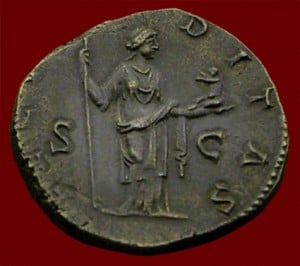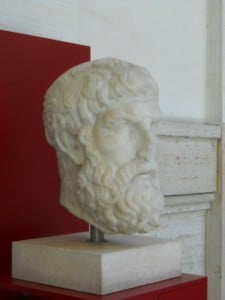In recent weeks a discussion began with the leading members among those who share in Romanitas as cultores Deorum. This discussion concerned what beliefs we hold in common. The intent was initially to provide a general statement for the Cultores Deorum Romanorum (CDR) website that would distinguish us as a fellowship of worshipers, as a community and a communion. We have since expanded our discussion at the Yahoo Groups, Religio Romana Cultorum Deorum (RRCD) for individual Romani to voice their own views on some of the issues raised. Since then the discussion continues and has carried on even to the blogs of some of the participants. The blogs have responded to some of the issues I had thrown out for the purpose of discussion, so perhaps I ought to lend my own thoughts here.
Certainly in the festivals and rituals that we keep in the Religio Romana, there is an implicit belief in the existence of the Gods of ancient Rome. How the cultores view the nature of the Gods offers a wide spectrum of views. In part this may be due to their different philosophies, as some describe themselves as Pythagoreans, others as Platonists, Neoplatonists or skeptics, while still others see themselves as Stoics. I am one of the latter, having been raised on Stoic principles by my parents, reinforced later in life by my experiences in the US Army, and further nurtured by both ancient and modern Stoic authors, such as in the lectures of Vice Adm. James Stockdale to the Midshipmen of Annapolis.
That is not to say that my views on the Gods necessarily adhere to the classic Stoic position. Stoic theology held there to be a God who is intelligent, a designing fire, encompassing all of the seminal principles, that pervades the whole World and all within it as a breath of divinity, that moves from a singular source and returns into the Origin, through a series of creative act acts and conflagrations. Stoic theology is pantheistic, or at least borders on the idea that everything, united into one, is God. My first objection to this view is that an idea holding to the origin of everything in this universe and in all the other universes as a single source is simply a human construct. Meanwhile we find a great amount of variety in the nature of our own plant, variety between the planets of our immediate solar system, and a variety of star systems within our own galaxy. Then consider the various ages of this planet and of all the other possible planets, galaxies, universes. To say that all this variety originated from a single source, a single God as some philosophies held or as as many religions have held, just seems to contradict its own logical. It is the same dilemma as determinists have in saying that the universe is one of cause and effect, with everything that exists resulting from a cause, and that all causes have resulted from a single cause. That seems a bit presumptive to me, as well as contradictory to their own definition of a universe. There is nothing that says that the Origin of all the great variety in Nature is not itself a collection of divinities, henads, or principles simply interacting with one another.
The higher Gods, Those Who are cosmic deities, I refer to as the Di involuti in the same way that another Stoic, Seneca the Younger, called Them. Are They a part of the Universe, or might They stand above and beyond the Universe, either way interweaving the complex strands of fate? Well, I don’t think it really matters to us. The Di involuti are beyond our comprehension, but I find it more comforting, even more reasonable as a starting position to see the variety of Nature as a reflection of the variety that exists in Nature’s origin.
Are the Gods archetypes of our unconsciousness? Certainly They have become so in the psyche of Western civilization. We find portrayals of the Gods in mythology, in art, in the decorations of public and private constructions, in plays, dance, music videos, and commercials. What is that one car commercial were it is taken up by Neptune, and by space aliens, and arrives through a time portal in a Mayan plaza? Or another commercial for a chocolate that fell from the Olympians? The ancient Gods, as archetypes, are a part of our culture and our western heritage. And yet those archetypes are a projection from something before. The Gods are not simply and merely archetypes.
Are the Gods forces of Nature? The higher Gods are certainly expressed in Nature as principles and as forces. We call the presence of a God or a Goddess a numen (pl. numina). As when a person radiates heat, and his warmth may be felt even after he has left, the numen of a God may remain for a while in a location as a force that graces it, makes a place in Nature more lush and vibrant than in other places. Or a numen can be a kind of energy that extends from a God into a labor or craft. But just as we say that there is a part of the divine within each of us, there is also a living energy in all things. Into that living genius of some place or object or animal or plant, the numina of the Gods may extend into them, as a presence that graces them. Roman poets spoke of the footprints of the Gods to describe places that had been touch by a God or Goddess, leaving Their numina in such places. They spoke of the numen of Ceres that transformed grain into bread, the numen of Bacchus that transformed fruit into wine, the numina of Neptune and the Gods of the sea that made our oceans once team with life, numina that controlled the weather, convulsed the earth, and conformed the stars to their paths. But like archetypes, these forces of Nature and spirits in Nature, transmit from something else.
Has a God an individual persona? Are the Gods anthropomorphic as Greco-Roman art portrayed Them? Well, the ancients well understood that anthropomorphic representations of the Gods was merely a human convention, a means by which we communicate with the Gods by projecting a human image on Them. And the Gods and Goddesses in turn communicate with us sometimes by appearing to us in a human-like form. Statues and other images of the Gods in an anthropomorphic form makes a decorative representation, but I don’t think any of us really believe that the Gods and Goddess would look like us. There is even a tradition in the Religio Romana, attributed to our founder Rex Numa Pompilius, that the Gods not be represented by images during ritual. Rather we might use a living fire, as in the worship of Vesta and some other most ancient deities. At one time planks painted white shown for the “shining ones,” the Aisai. Perhaps, too, we project a persona on the Gods, as a means through which we may relate to Them. But this also implies that there is something else, a divine entity, onto which we project such an image and a persona.
Can the Gods be experienced? Yes. I give a rather emphatic approval of this assertion due to my own experiences. First, going back to something I said earlier, it is difficult for me to understand how some people can declare that they believe in one god or spiritual being and forget the possibility that other spiritual beings exist. It seems more natural to assume that not only are there more than one god or goddess, but more than one kind of god and many kinds of goddesses. When I say “the Gods” in a general sense I include alongside a variety of higher deities and semi-divi also our ancient forebearers, our ancestors and deceased family members. I shall get to the Lares at another time, but to put it simply, within each man there is a divine genius, and within every woman a divine juno, which continues its existence after the death of the body, and this divine part is called a Lar when it has been released from the physical form. So I do believe in many types of divine entities, as well as in a variety of Gods and Goddesses. And, yes, I believe that we can experience the Gods, because in my life I have experienced Them, as have others I known heard and envisioned the Gods, as well as intuited Their presence. There are even some I have met who have come upon the Gods and were unable to express what they felt, because their own religious tradition denied the existence of these divine beings in Nature. And yet they knew what they had come upon, as though by some primal recognition here was a divine being. I have experienced the Gods and thus believe in Them, neither as an intellectual pursuit nor by convention, but as a tangible part of my life experiences.
In discussing some of the other topics of interest, I suppose more of my thoughts and beliefs on the Gods and Goddesses shall come out. Meanwhile you can visit these sites to read more of the discussion at places I mentioned above, and also catch some of my own thoughts among them.
The Cultores Deorum Romanorum website: https://sites.google.com/site/cultusdeorumromanorum/ See the “Voices From Our Community” feature at https://sites.google.com/site/cultusdeorumromanorum/english
Discussion email group: [email protected], http://groups.yahoo.com/group/Religio_Romana_Cultorum_Deorum/?yguid=163640832
V. Adm. J. Stockdale, USN Rtd., Lecture 1: The Stoic Warrior’s Triad: http://www.usna.edu/Ethics/Publications/stoicism1.pdf
V. Adm. J. Stockdale, USN Rtd., Lecture 2: Master of My Fate: http://www.usna.edu/Ethics/Publications/Stoicism2.pdf















